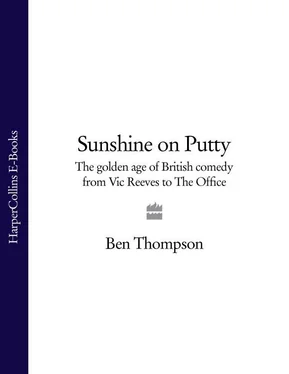Don’t ask me why. I don’t make the rules.
One thing which is as clear as Ricky Gervais’s conscience 10is that whatever is particular to the post-alternative epoch begins with Vic Reeves and Bob Mortimer (readers keen to find out why it ends with The Office are advised to stock up on tinned goods and dry biscuits and sit it out till the conclusion). Throughout their fifteen-year light-entertainment odyssey, this unique pairing have demonstrated an all-the-more-uncanny-for-apparently-being-unconscious propensity for anticipating – in their failures as well as their successes – the future movements of the comedic barometer.
A source of huge delight to their admirers, this laughter-diviners’ gift has not gone unnoticed by their enemies either. In his 2000 short-story collection Barcelona Plates, erstwhile alternative overlord Alexei Sayle ‘created’ a comic double act called Nic and Pob. Nic and Pob are a pair of ‘apparently genial rubbish-talking Northerners’ who live (as Vic Reeves and Bob Mortimer almost did, at the time Sayle was writing) in ‘back to back Kentish mansions’.
‘Their arrival on the comedy scene’, asserts that man who himself rose to public prominence at the turn of the previous decade with that fearsome piece of lyrical dialectic ‘Ullo John, Got A New Motor’, ‘had fortunately coincided with the rise of stupidity.’ Never mind poacher-turned-gamekeeper, this is pickpocket-turned-chief-of-police, and the apparent self-awareness of Sayle’s qualifying phrase (‘the public having tired of being shouted at by fat men about things that weren’t their fault as a form of entertainment’) does nothing to dispel the overpowering stench of sour grapes.
Neither does the fact that the ill-intentioned little story which follows is an abysmally sub-Vic-and-Bob farrago of half-assed voodoo ritual and blatant product placement. Still, the notoriously fragrance-conscious Reeves has not been averse to the stink of a spoiled vine in his time (at the height of his mid-nineties pomp, he once imagined himself in later life ‘sitting outside the BBC throwing pieces of coal at newcomers’), and they do say that in comedic circles outright frontal assault comes second only to imitation as the sincerest form of flattery.
Reeves and Mortimer have certainly not wanted for the latter tribute in recent years. Watching the Big Night Out on an ancient video now is like watching a blueprint for the next thirteen years of British TV in the form of a very strange dream. From The All-New Harry Hill Show to I’m A Celebrity Get Me Out Of Here!, from the unrepentantly Jackie Milburnesque enunciation of the Big Brother narrator Marcus Bentley to more or less every aspect of the onscreen demeanour of ITV’s new kings of prime-time Ant and Dec, 11it’s all in there. The miraculous thing is that at the same time as being eerily familiar, the show still manages to seem like a transmission from another planet, picked up randomly from the ether.
2. What in the name of Bob Monkhouse’s stolen jokebook does ‘Sunshine on Putty’ mean?
The title Sunshine on Putty originates exactly one hundred years before the first Channel 4 edition of Vic Reeves Big Night Out which marks our story’s official starting-point. The people we have to thank for it are English lesbian literary icons Katherine Bradley and her niece and lover Edith Cooper. This mercurial pairing wrote eleven plays and thirty volumes of poetry together under the coyly macho pen-name of Michael Field (on the grounds – understandable in a Victorian England whose perennially unamused matriarch could not bring herself to accept the existence of Sapphic love – that ‘we have things to say that people will not hear from a woman’s lips’).
Perhaps the best known of these hilariously florid and overblown works is an epic poem about their dog, rejoicing in the title Whym Chow: Flame of Love. The eponymous canine’s real-life role as ‘sex symbol, god made flesh and embodiment of the masculine principle’ was, their biographer Emma Donoghue later noted, 12‘a heavy burden of meaning for one small dog to bear…Not surprisingly, it went to his head and he became a tyrant.’ On one occasion, when Whym Chow’s foul temper had prevented them from going to the beach, Bradley and Cooper excused him in verse with the classic couplet ‘Bacchic cub, Thou could’st not bear to face the sea’. But, in the immortal words of Ronnie Corbett, I digress.
In the summer of 1890, on meeting the celebrated Irish playwright and novelist George Moore, Bradley and Cooper noted in their diary that his smile was ‘like sunshine on putty’. It is hard to be sure exactly what they meant by this observation, though they probably did not intend it as a compliment. (Moore is one of those tragic whipping boys of destiny – like Sir Geoffrey Howe or Bobby Davro – who seem destined to be remembered chiefly as the butt of other people’s insults.) 13
However, if the phrase ‘sunshine on putty’ is dramatically uprooted from its original context and applied with a reckless flourish to the recent history of British comedy, its ambivalence becomes entirely felicitous. On the one hand it evokes a pleasurable sensation – a feeling of warmth and light in a clammy and mutable world – on the other, a specific impact: a sense of helping along a process of coalescence that was already ongoing.
Consider for a moment the almost innumerable ways in which daily life in this country is different now from the way it was at the beginning of the last decade. Who would have predicted in 1990 that within little more than ten years it would be hard to remember what it was like to live under a Tory government (or at least one which called itself that)? Or that the thirsty need no longer dream of pubs that would be open all day, and the hungry could entertain the real possibility of a decent sandwich in almost every town and city in Britain (so long as they had the money to pay the premium for Pret à Manger pine nuts)? Or that Scotland and Wales would have their own parliaments and someone who wasn’t a neo-Nazi might fly the flag of St George on the front of their car? Or that on the days when Sara Cox managed to get out of bed for the breakfast show, you could listen to Radio 1 all day from 7 a.m. till 5.45 p.m. and Jo Whiley would be the only DJ you’d hear who didn’t come from Manchester or Leeds? 14Or that a terrestrial TV programme would exist which would keep a twenty-four-hour watch on a group of wannabe daytime travel-show presenters in the hope that a drunken maverick cockney dental nurse might embark upon an ill-advised sexual adventure?
It would be easy (not to mention quite fun) to go on like this all day, but when it comes to the trickier business of establishing the connection between these almost subliminal changes in the fabric of everyday life and the recent history of British comedy, only a famous French philosopher who sounds like he ought to play for Arsenal can help us.
What Henri Bergson has to say about all this
The French philosopher Henri Bergson’s 1900 intellectual landmark Le Rire – helpfully translated into English as Laughter in 1911 – is most celebrated for its contention that much of what is considered comic can be boìled down to moments where ‘the human reduces itself to the automatic’. In a less frequently quoted passage of the book, Henri makes the seemingly straightforward assertion that ‘to understand laughter we must put it back into its natural environment, which is society’.
‘Laughter appears to stand in need of an echo,’ Bergson notes. ‘It can travel within as wide a circle as you please; the circle remains, none the less, a closed one.’ To illustrate this notion, he uses the example of travellers sharing a joke in a railway carriage while another passenger sits across the aisle, forbidden by basic etiquette from joining in. ‘Had you been one of their company,’ Bergson chuckles, ‘you would have laughed like them.’
Читать дальше












